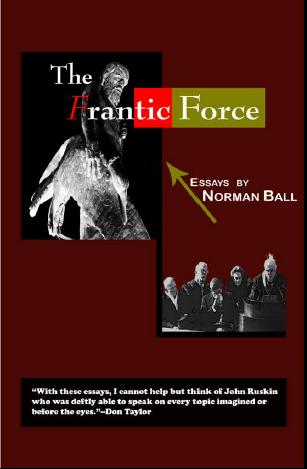
The Frantic Force
by Norman Ball
Essays
Norman Ball might best be described as a Renaissance man with a Nietzschean will to power, not for the sake of power itself but the fuel that drives his almost furious production of first-rate writing and music. The Frantic Force provides an excellent introduction to Ball's singular mind. He first won my favor with his approach to what I call the "wandering essay," nonfiction pieces that refuse the Strunk & White commandments and stalk elusive subjects to their hiding places, refusing their escape but also avoiding jailing them in simple conclusions. Those familiar with W.G. Sebald's work will recognize in Ball's work a similar mapping of unknown territory. His fiction, nonfiction and poetry share one trait: Whatever their subject, you'll see that subject in a dozen or more ways you never previously imagined.
... liberals maintained their infinite suspension through these last few years of national depression both economic and emotional....
Consider "Intolerable Tolerance: Taking on Liberal Fundamentalism," a well-timed piece for the era of disappointment and disenchantment felt by those who mistakenly bought Obama's propaganda and then paid the usual price for misplaced trust: utter cynicism. Aware that all-too-true-blue liberals still support Obama despite his having violated what little remains of his party's diminishing agenda. Yes, even cynical voters — and I was one of them — drank the "their own Kool-aid" in buying what in retrospect reveal themselves to be the usual empty chants of "hope" and "change." Somehow, the parade hypnotized even cynics, but it's the "real liberals" who prove themselves "terminal believers, too frightened to forge a rapprochement with paradox. Acted out, their fear routinely imperils the world. Liberals, when they break faith with full-bodied tolerance, are every bit as dangerous as the wild-eyed jihadists of media-lore." It's hard to believe such idealistic liberals maintained their infinite suspension through these last few years of national depression both economic and emotional. Ball goes well beyond these facile observations, dissecting the social liberal agenda of meaningless multiculturalism, in which acceptance of everything leads to a political void ripe for the fascist pickings. "Many liberals (in the classical sense) are contemptuous of all orthodoxies, even as they fail to see their own. In this absolute adherence to relativity, they share a feature common to all fundamentalists — intolerance — cloaked albeit, and with devilish paradox, in the mantra of tolerance." From there, Ball pursues every question his own argument raises, accepting the paradoxes his replies create and for readers providing emergency relief from the simplifications of what today passes for todays public intellectuals, whose opinions provide a bipolar choice between two polar similarities: Get lost at sea or in the desert, the "rewards" amounting to dehydrated delusions or sunbaked mirages.
Even more acutely perceptive, "Poetry: Couched in the Beyond" considers the lack of merit so prevalent in today's poetry. His critique searches for the psychological, theological and philosophical dimensions of a trend towards sorrowful and self-pitying poems, so reminiscent of the epitome of literary voyeurism: memoirs. Ball plainly states the predicament to which such writers remain blind yet profit from by sharing their blindness with their equally-blind audiences: "The relentless unearthing of the self is, in the end, an unfulfilling quest. As Becker notes ruefully, 'when you narrow down the soul to the self…you have the individual man, and you are stuck with him.' Rank argued that, far from a path to nirvana, relentless psychoanalyzing was a ‘negative and disintegrating ideology’, a slayer of mystery." Most readers who've tried to "find themselves" will ruefully agree they never do no matter how many untaken roads they take. Thus, "Poetic sensibility is not the same as teenage sensitivity. As Becker points out, all that separates the neurotic from that true soldier, the artist (Kierkegaard’s knight of faith), is the courage for talent. The self-absorbed artist is simply verbose and boring." Yes, what happened to guts? For all his bombast, Mailer at least had the guts he claimed if a bit promiscuous in displaying them: Did Truman Capote really require a physically violent response? And yet, Mailer's typically narcissistic and self-promoting bid to become mayor of New York City gave writers the slogan to which all should abide: "No more bullshit." At his best, Mailer displayed real courage, particular in The Executioner's Song, an unrecognized masterpiece that penetrates evil to the blankness that lies behind it. How many writers go to such dark places today? Indeed, where is courage to be found in 99 percent of the "literature" by committee that manages to establish writers incapable of bearing the telling of any tale that doesn't follow the dot-to-dot course from pseudo-suffering to pseudo-redemption? Ball's notion that lack of soul accounts for the depressing descent of poetry and literature as a while explains why today's writing triggers a reaction of the intensity a greeting card induces. We may say the same of much popular. Yes, where's the soul, not only in the theological sense but equally the James Brown's sense?
These two essays will suffice; better to review two essays, for reviewing a dozen of Ball's pieces would do them a disservice or require a book in itself. But if one theme proves common to these varied pieces, it's the visceral sense that Ball writes as a man heartbroken by the quasi-culture in which he lives, yet possessing the courage not only to ask why but to continue writing his own fiction and poetry despite America's hurricane of the mundane.

